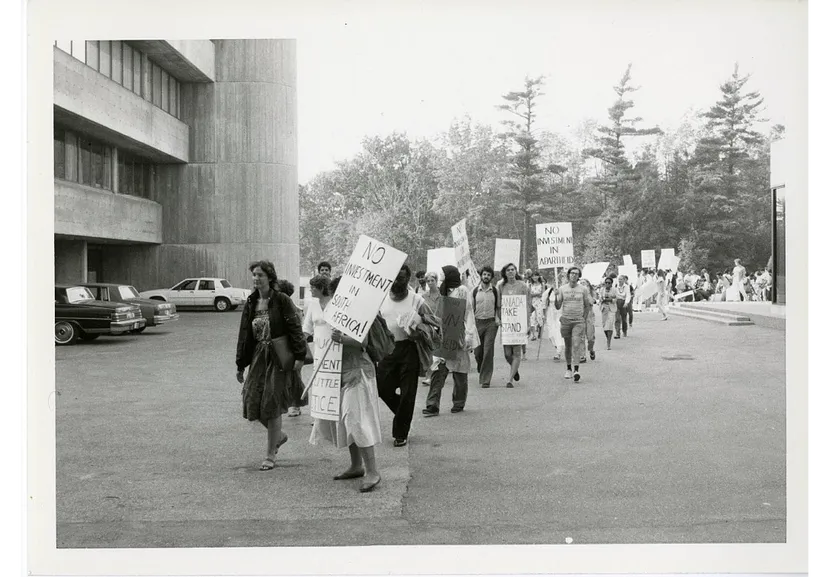Why Pension Divestment?
Table of Contents
Defining Divestment
divestment (n): the sale or other disposal of a financial asset
Divestment means that we call upon the University Pension Plan to sell its direct and indirect investments in companies which violate human rights, and reinvest that money elsewhere. It’s not a loss, it’s a reallocation.
Divestment is a non-violent tool with which everyday people hold foreign nation-states and international systems to account when their own governments fail to do so. The aim of divestment is to ensure accountability to international law and the universal principles of human rights by applying economic pressure. Divestment recognizes that each of us is made complicit when our pension money supports the violation, abuse and oppression of other human beings. Equally, this tactic refuses to support companies which profit from human rights violations.
Whereas, in a consumer boycott, we might stop buying products which perpetuate and uphold injustice, the complex nature of modern-day investments means that we are often unaware of our complicity until we research our investments further. Since pension investments require group buy-in, we cannot divest alone; we must act together. Pensions – our deferred wages – are one of the largest and most significant investments which workers have the power to divest in order to end apartheid, illegal occupation and genocide.
Divestment is not a tactic which is applied lightly. Many readers will be familiar with the important role which boycott, divestment and sanctions played in pressuring the South African government to end apartheid. Taking inspiration from that struggle, in 2005, 170 Palestinian labor unions, refugee networks, women’s organizations, professional associations, popular resistance committees, and other Palestinian civil society bodies launched the movement for Boycott, Divestment and Sanctions in response to Israel’s persistent violations of international law. The call, which we encourage all readers to consult in full, notably cited:
- Israel’s continued construction of the separation Wall, with total disregard for the International Court of Justice’s historic 2004 advisory opinion that the Wall is illegal;
- the continued occupation of the West Bank (including East Jerusalem), the Gaza Strip, and the Golan Heights;
- the continued expansion of illegal settlements/colonies;
- the continuing refugee status of a majority of Palestinians, many of whom are stateless;
- and an entrenched system of racial discrimination against Arab-Palestinian citizens of Israel.
Since that time, the BDS movement has successfully held companies profiting from Palestinian dispossession to account.

Divestment in Ontario
Ontario bears a history of recognizing the importance of divestment as a path to international justice. In 1990, the province passed the South African Trust Investments Act, which permitted all pension funds to dispose of South African investments without breaching the trustee’s statutory or other legal duties. This historical legal precedent for refusing complicity with apartheid demonstrates that it is indeed possible for the province to divest pension funds without compromising fiduciary duty, when political will is present. Today, we mobilize for divestment as a proven tactic with which to compel political action on apartheid and illegal occupation, and to hinder the capacity of weapons manufacturers to continue supplying the State of Israel as it commits a genocide against the Palestinian people. We also demand that this same principle of divestment from companies that profit from human rights violations be equally applied to Sudan, Congo, and elsewhere.
In fact, we are not the only BDS-driven pension divestment campaign currently active in Ontario. Members of the Ontario Teachers’ Pension Plan (OTPP) are also calling on their pension to drop companies which facilitate war and occupation – and in 2025, they won divestment from two major complicit targets.

UPP Divestment
The University Pension Plan (UPP) has already demonstrated its capacity to act decisively in the face of violations of international law and human rights. When Russia invaded Ukraine on February 24, 2022, it took UPP less than two weeks to issue their assurance of the total exclusion of Russian assets. “We have made our position clear – breaches of international law have no place in UPP’s portfolio,” the Plan declared. This was not merely a response to sanctions placed on Russia by the Canadian government; UPP’s CEO Barb Zvan and Trustee Alan Jette were among the business leaders who issued an open letter to the government of Canada in support of stricter sanctions. In other words, UPP’s investment exclusion on Russia appears not to be a mere response to Canadian government sanctions. Rather, UPP adopted its own principled stance on investment exclusion in a situation where international law was being violated, and called on the government of Canada to enact the financial measures which it deemed appropriate.
In view of this strongly declared stance against investments which violate international law, we must ask: where is UPP’s statement on Palestine? In January 2024, the International Court of Justice (ICJ) affirmed the plausibility that Israel is violating the Genocide Convention in Gaza; yet, over a year and a half later, UPP has taken no action to exclude investments which are funding genocide, apartheid, and illegal occupation. Importantly, these investments are not only domiciled in Israel; in fact, the majority of UPP’s complicit investments are domiciled in the United States.
Corporations and investors are also bound by ethical and legal obligations. UPP’s failure to uphold its own declared principles of responsible investing constitutes yet another glaring example of “the Palestine exception” – the exception which is made to internationally recognized human rights when it comes to Palestinians. We vehemently reject this exception – which is grounded in anti-Palestinian racism – and affirm the rights of all peoples, including Palestinians, to live free of genocide, apartheid, and illegal occupation. To this end, in accordance with its own stated ESG principles, we demand that the University Pension Plan divest from all companies which are profiting from the ongoing violence of Palestinian dispossession. The practicability of divestment has already been proven by the Plan’s decision to remove fossil fuel investments from its portfolio. Divestment from genocide, apartheid and illegal occupation must be enacted now.
